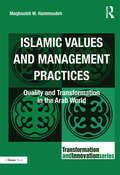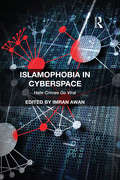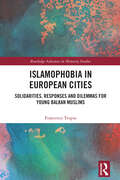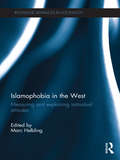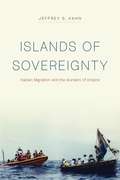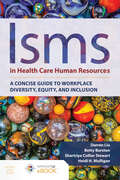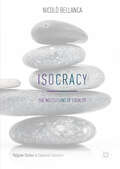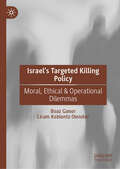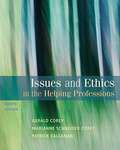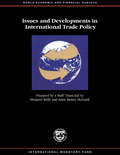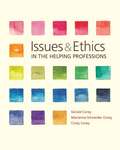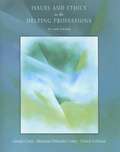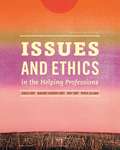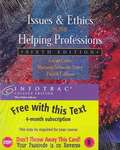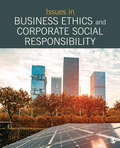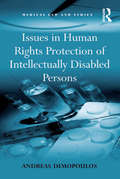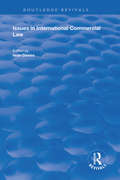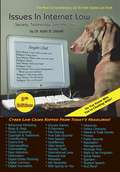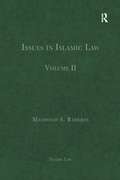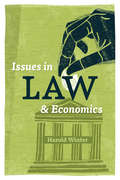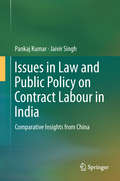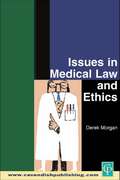- Table View
- List View
Islamic Values and Management Practices: Quality and Transformation in the Arab World (Transformation and Innovation)
by Maqbouleh M. HammoudehThe author of this thought provoking addition to Gower's Transformation and Innovation Series has worked as a management consultant in the Arab Middle East for 25 years. In Islamic Values and Management Practices she acknowledges that businesses and other organizations in the region face urgent concerns in relation to quality and transformation, but argues that these issues might be more appropriately addressed by the application of an Islamic Management Model, rather than the 'Western' one hitherto applied. Over time, a set of management systems based on Islamic values has been developed by the author. These systems recognise the need to build human organizations, socially and politically as well as commercially, and also the recognition that for Muslims, justice is the ultimate value, bringing balance between the individual's soul and spirit on the one hand, and the organization's soul and spirit on the other. This Islamic management model stresses that effectiveness is an outcome of operating efficiently and at the same time unifying the organization's objectives with those of its employees and wider society, and ensuring that at the strategic level the long view is always maintained. Recounting her own personal and business journey, Maqbouleh Hammoudeh presents the outcomes of research that has tested the application of the Islamic Management Model and its ability to deliver the desired quality and transformation outcomes in a major civic or profit making organization. At a time when many practitioners and business educators are seeking new management approaches, this revealing case study sheds light on the evolution of a contemporary theory of management for the Muslim World.
Islamic Veiling in Legal Discourse
by Anastasia VakulenkoIslamic Veiling in Legal Discourse looks at relevant law and surrounding discourses in order to examine the assumptions and limits of the debates around the issue of Islamic veiling that has become so topical in recent years. For some, Islamic veiling indicates a lack of autonomy, the oppression of women and the threat of Islamic radicalism to western secular values. For others, it suggests a positive autonomous choice, a new kind of gender equality and a legitimate exercise of one’s freedom of religion – a treasured right in democratic societies. This book finds that, across seemingly diverse legal and political traditions, a set of discursive frameworks – the preoccupation with autonomy and choice; the imperative of gender equality; and a particular western understanding of religion and religious subjectivity – shape the positions of both proponents and opponents of various restrictions on Islamic veiling. Rather than take a position on one or the other side of the debate, the book focuses on the frameworks themselves, highlighting their limitations
Islamophobia in Cyberspace: Hate Crimes Go Viral
by Imran AwanCyber hate can take many different forms from online material which can lead to actual offline abuse and violence, cyber violence; cyber stalking, and online harassment with the use of visual images, videos, chat rooms, text and social media which are intended to cause harm. This book examines the case for current guidelines dealing with online anti-Muslim abuse and concludes that we require a new understanding of this online behaviour and the impact it can have on vulnerable communities. It is unique as it focuses on new technology in the form of social media and the Internet and explores the challenges the police and other agencies face when confronting anti-Muslim abuse in cyberspace. It also provides a critique of how people are targeted by online offenders and helps us understand online anti-Muslim behaviour in a much more detailed and comprehensive way by bringing together a range of experts who will examine this phenomenon and critically discuss why they think it has become so much more prevalent than it was before.
Islamophobia in European Cities: Solidarities, Responses and Dilemmas for Young Balkan Muslims (Routledge Advances in Minority Studies)
by Francesco TrupiaThe demise of socialism in Southeast Europe coincided with the breakout of wars and genocidal violence against local Muslim populations. After being displaced and forced to migrate to different European countries, those former socialist citizens quickly developed institutions of sociability and unobtrusively enacted postulates of solidarity. This book brings a spotlight on the “generations after” born to Balkan Muslim families whose repatriation could not take place due to the continuous political instability and insecurity in their homelands. It investigates the new modes of these “second generations” to respond to the current crisis of liberal democracy and rampant Islamophobia in their places of residence. By relating spatial issues to broader religious and political questions, this study shines a light on the civic engagement, religious practices and political sensitivities of young Muslims with Balkan roots in Belgium, Germany, Italy and Poland. The book will be of interest to academics, researchers and policy-makers working in the areas of Islamic Studies, Migration Studies, Anthropology of Religion and Memory Studies.
Islamophobia in the West: Measuring and Explaining Individual Attitudes (Routledge Advances in Sociology)
by Marc HelblingSince the late 1980s, growing migration from countries with a Muslim cultural background, and increasing Islamic fundamentalism related to terrorist attacks in Western Europe and the US, have created a new research field investigating the way states and ordinary citizens react to these new phenomena. However, whilst we already know much about how Islam finds its place in Western Europe and North America, and how states react to Muslim migration, we know surprisingly little about the attitudes of ordinary citizens towards Muslim migrants and Islam. Islamophobia has only recently started to be addressed by social scientists. With contributions by leading researchers from many countries in Western Europe and North America, this book brings a new, transatlantic perspective to this growing field and establishes an important basis for further research in the area. It addresses several essential questions about Islamophobia, including: what exactly is Islamophobia and how can we measure it? how is it related to similar social phenomena, such as xenophobia? how widespread are Islamophobic attitudes, and how can they be explained? how are Muslims different from other outgroups and what role does terrorism and 9/11 play? Islamophobia in the West will be of interest to students and scholars of sociology, religious studies, social psychology, political science, ethnology, and legal science.
Islands of Sovereignty: Haitian Migration and the Borders of Empire (Chicago Series in Law and Society)
by Jeffrey S. KahnIn Islands of Sovereignty, anthropologist and legal scholar Jeffrey S. Kahn offers a new interpretation of the transformation of US borders during the late twentieth century and its implications for our understanding of the nation-state as a legal and political form. Kahn takes us on a voyage into the immigration tribunals of South Florida, the Coast Guard vessels patrolling the northern Caribbean, and the camps of Guantánamo Bay—once the world’s largest US-operated migrant detention facility—to explore how litigation concerning the fate of Haitian asylum seekers gave birth to a novel paradigm of offshore oceanic migration policing. Combining ethnography—in Haiti, at Guantánamo, and alongside US migration patrols in the Caribbean—with in-depth archival research, Kahn expounds a nuanced theory of liberal empire’s dynamic tensions and its racialized geographies of securitization. An innovative historical anthropology of the modern legal imagination, Islands of Sovereignty forces us to reconsider the significance of the rise of the current US immigration border and its relation to broader shifts in the legal infrastructure of contemporary nation-states across the globe.
Isms in Health Care Human Resources
by Darren Liu Betty Burston Shartriya C. Stewart Heidi H. MulliganIsms—typically defined as harmful and discriminatory philosophies or views—are a threat to human unity and may affect outcome maximization in healthcare workplaces. Isms in Health Care Human Resources: A Concise Guide to Workplace Diversity, Equity, and Inclusion lays a foundation in which readers can become familiar with diversity, equity and inclusion issues in the workplace and gain an understanding of how isms in health care can reduce output and elevate costs. After providing an overview of isms in healthcare and other workplaces, this concise text closely examines various isms, from central tendancyism and sexualism to IQism and heterosexism while covering a range of other isms. It then proposes strategies for intermediation for healthcare administrators in order to guide them in reducing isms in the workplace and, in turn, maximizing output. Thorough discussion of relevant current events and hot topics, including the Me-Too Movement and the growing advocacy for LGBTQ communities. Well-supported by extensive data & research on diversity, equity and inclusion in healthcare marketplaces. Concise length and focus on diversity, equity, and inclusion makes this text an excellent resource for any Health Care Human Resources or Organizational Leadership course. Instructor resources include an additional PowerPoint presentation on “Reducing Sexual Harassment in the Workplace by Unraveling its Causes” and a test bank that assesses Level 1, Level 2, and Level 3 healthcare administration competencies. Each new print copy includes Navigate 2 eBook Access to read your digital textbook online or offline, on computers, tablets, and mobile devices. Jones & Bartlett Learnng has proudly contributed copies of this text for AUPHA's 2020 Bugbee-Falk Book Award. Graduate and undergraduate courses in health care human resources and/or organizational behavior in health care. Could also be used as a supplement in a Health Disparities or Cultural Competence course, and/or a course or seminar in Professional Development. © 2021 | 150 pages
Isocracy: The Institutions of Equality (Palgrave Studies in Classical Liberalism)
by Nicolò BellancaIn the twentieth century there were two great political and social paradigms, the liberal-democratic and the libertarian (in its various socialist, anarchist, and communist delineations). The central idea of the first approach is isonomy: the exclusion of any discrimination on the basis that legal rights are afforded equally to all people. The central idea of the second approach is rather to acknowledge and address a broader spectrum of known inequalities. Such an approach, Bellanca argues, allows the pursuit of pluralism as well as a more realistic and complex view of what equality is. Here he analyzes the main economic and political institutions of an isocratic society, and in so doing, effectively outlines how a utopian society can be structurally and anthropologically realized.This book is ideal reading for an audience interested in the critique of contemporary capitalism through a renewed perspective of democratic socialism and leftist libertarianism. Nicolò Bellanca is Associate Professor of Development Economics at the University of Florence, Italy. He is the author of a broad array of scholarly articles, books and textbooks about both the history of economic thought and development economics. His current research focuses on the theory of institutional change.
Israelis and Palestinians: From the Cycle of Violence to the Conversation of Mankind
by Jonathan GloverCan Israelis and Palestinians end their long conflict? The shocking violence of current events undermines hope, as does the long history of peace deals sabotaged by extremists on both sides. In this compelling and timely book, the eminent moral philosopher Jonathan Glover argues that one vital step towards progress is to better understand the disturbing psychology of the cycle of violence. Glover explores the psychological flaws that entrap both sides: the urge to respond to wounds or humiliation with backlash; political or religious beliefs held with a rigidity that excludes compromise; and people’s identity being shaped by the conflict in ways that make it harder to imagine or even desire alternatives. Drawing on the history of comparable conflicts that eased over time, Glover proposes some ways to gradually weaken the grip of this psychology. Completed as casualties mounted in the latest political and humanitarian crisis, Israelis and Palestinians is essential reading for anyone concerned by the ongoing violence in the Middle East.
Israel’s Targeted Killing Policy: Moral, Ethical & Operational Dilemmas
by Boaz Ganor Liram Koblentz-StenzlerThe book explores the main moral, ethical and operational dilemmas of targeted killings from an Israeli perspective. Even though many countries contending with terrorism have adopted this tool (either overtly or covertly) within the arsenal used in implementing their counter-terrorism policies, it seems that Israel, as one of the world's leading practitioner of targeted killing in its counter-terrorism effort, constitutes the most appropriate case study for reviewing implications and dilemmas associated with this practice. Each chapter will present a different ethical–moral–operational dilemma emanating from a deployment of a targeted killing. The analysis of Israeli considerations and solutions to these dilemmas is built around interviews with Israeli decision-makers, former senior security officials and other experts. The chapters also cover public opinion polls in order to highlight the views of the Israeli public vis-a-vis each dilemma. Finally, chapters will conclude with lessons learned and offer recommendations for a practical and moral solution. The final chapter then draws together universal conclusions and recommendations for the use of targeted killings.
Issues And Ethics In The Helping Professions
by Gerald Corey Patrick Callanan Marianne CoreyAimed at both undergraduate and graduate students in the helping professions, this textbook addresses various ethical, legal, and professional issues they will encounter in their future careers. Each chapter begins with a self-inventory, and open-ended cases and situations are presented throughout to stimulate thought and discussion. Topics include (for example) the management of boundaries; the incorporation of spiritual and religious values; and the fulfillment of record keeping responsibilities.
Issues and Developments in International Trade Policy
by Bernhard Fritz-Krockow Peter Winglee Clemens Boonekamp Yoon Je Cho Peter UimonenA report from the International Monetary Fund.
Issues and Ethics in the Helping Professions (10th Edition)
by Gerald Corey Marianne Schneider Corey Cindy CoreyUp-to-date and comprehensive, this practical best seller provides students with the basis for discovering their own guidelines for helping within the broad limits of professional codes of ethics and divergent theoretical positions. Respected authors Gerald Corey, Marianne Corey, and Cindy Corey raise what they consider to be central issues, present a range of diverse views on the issues, discuss their position, and provide opportunities for students to refine their thinking and develop an informed position. With new material in every chapter and an emphasis on critical thinking, Issues and Ethics in the Helping Professions, 10th Edition, is useful for students as well as practicing professionals.
Issues and Ethics in the Helping Professions (7th Edition)
by Gerald Corey Marianne Schneider Corey Patrick CallananUp-to-date and comprehensive, this practical best-selling text now available with an online personalized study plan, helps students learn how to deal with and apply ethical standards. The authors provide readers with the basis for discovering their own guidelines within the broad limits of professional codes of ethics and divergent theoretical positions. They raise what they consider to be central issues, present a range of diverse views on these issues, discuss their position, and provide readers with many opportunities to refine their own thinking and to actively develop their own position. The authors explore such questions as: What role do the therapist's personal values play in the counseling relationship? What ethical responsibilities and rights do clients and therapists have? And, what considerations are involved in adapting counseling practice to diverse client populations?
Issues and Ethics in the Helping Professions (Ninth Edition)
by Gerald Corey Marianne Schneider Corey Patrick Callanan Cindy CoreyUp-to-date and comprehensive, this practical best-selling text helps readers learn how to deal with and apply ethical standards. It provides readers with the basis for discovering their own guidelines within the broad limits of professional codes of ethics and divergent theoretical positions. The authors raise what they consider to be central issues, present a range of diverse views on these issues, discuss their position, and present many opportunities for users to refine their own thinking and actively develop their own position. Readers explore such questions as: What role do the therapist's personal values play in the counseling relationship? What ethical responsibilities and rights do clients and therapists have? What considerations are involved in adapting counseling practice to diverse client populations?
Issues and Ethics in the Helping Professions (with InfoTrac)
by Gerald Corey Marianne Schneider Corey Patrick CallananUp-to-date and challenging, this best-selling text is a practical manual that helps future and current professionals deal with ethical issues that they will confront at the various stages in their development. The authors provide readers with the basis for discovering their own guidelines within the broad limits of professional codes of ethics and divergent theoretical positions. They raise what they consider to be central issues, present a range of diverse views on these issues, discuss their position, and provide readers with many opportunities to refine their own thinking and to actively develop their own position. The authors explore such questions as: What role do the therapist's personal values play in the counseling relationship? What ethical responsibilities and rights do clients and therapists have? What considerations are involved in adapting counseling practice to diverse client populations?
Issues in Business Ethics and Corporate Social Responsibility: Selections from SAGE Business Researcher
by Sage PublishingIssues in Business Ethics and Corporate Social Responsibility explores these foundational themes across a wide range of topics, including artificial intelligence, workplace surveillance, supply chain management, big data, the finance industry, and many more. Coupled with a broad introduction by Dr. David Weitzner, a professor of management at York University, this book provides students with the essential information they need to assess business practices through the lens of ethical decision-making and corporate social responsibility.
Issues in Business Ethics and Corporate Social Responsibility: Selections from SAGE Business Researcher
by Sage PublishingIssues in Business Ethics and Corporate Social Responsibility explores these foundational themes across a wide range of topics, including artificial intelligence, workplace surveillance, supply chain management, big data, the finance industry, and many more. Coupled with a broad introduction by Dr. David Weitzner, a professor of management at York University, this book provides students with the essential information they need to assess business practices through the lens of ethical decision-making and corporate social responsibility.
Issues in Human Rights Protection of Intellectually Disabled Persons (Medical Law And Ethics Ser.)
by Andreas DimopoulosThis book develops a legal argument as to how persons with intellectual disability can flourish in a liberal setting through the exercise of human rights, even though they are perceived as non-autonomous. Using Ronald Dworkin's theory of liberal equality, it argues that ethical individualism can be modified to accommodate persons with intellectual disability as equals in liberal theory. Current legal practices, the case law of the ECtHR on disability, the provisions of the UNCRPD and a comparative analysis of English and German law are discussed, as well as suggestions for positive measures for persons with intellectual disability. The book will interest academics, human rights activists and legal practitioners in the field of disability rights.
Issues in International Commercial Law (Routledge Revivals)
by Iwan DaviesOriginally published in 2005. It is now possible to identify, within the discipline of law, a distinct body of international commercial law. This engaging book consists of a wide-ranging series of essays which demonstrates the breadth and scope of the subject matter of international commercial law. Many of the themes identified bridge both national and international commercial law. The volume consists of three parts: Credit and Security; Contractual Issues; International Commercial Regulation. It is evident that international commercial law is concerned with private and public law within which there are particular disciplines ranging from banking law, e-commerce, intellectual property, insolvency and increasingly international regulation through criminal law extending beyond frontiers.
Issues in Internet Law: Society, Technology, and the Law (Ninth Edition)
by Keith B. DarrellThis book provides a concise overview of Internet law updated with the latest cases and trends.
Issues in Islamic Law: Volume II (Islamic Law Ser.)
by Mashood A. BaderinIslamic substantive law, otherwise called branches of the law (furu� al-fiqh), covers the textual provisions and jurisprudential rulings relating to specific transactions under Islamic law. It is to Islamic substantive law that the rules of Islamic legal theory are applied. The relationship between Islamic legal theory and Islamic substantive law is metaphorically described by Islamic jurists as a process of �cultivation� (istithmar), whereby the qualified jurist (mujtahid), as the �cultivator�, uses relevant rules of legal theory to harvest the substantive law on specific issues in form of �fruits� (thamarat) from the sources. The articles in this volume engage critically with selected substantive issues in Islamic law, including family law; law of inheritance; law of financial transactions; criminal law; judicial procedure; and international law (al-siyar). These areas of substantive law have been selected due to their contemporary relevance and application in different parts of the Muslim world today. The volume features an introductory overview of the subject as well as a comprehensive bibliography to aid further research.
Issues in Law and Economics
by Harold WinterIs file-sharing destroying the music industry? Should the courts encourage breach of contract? Does the threat of malpractice lawsuits cause doctors to provide too much medical care? Do judges discriminate when sentencing? With Issues in Law and Economics, Harold Winter takes readers through these and other recent and controversial questions. In an accessible and engaging manner, Winter shows these legal issues can be reexamined through the use of economic analysis. Using real-world cases to highlight issues, Winter offers step-by-step analysis, guiding readers through the identification of the trade-offs involved in each issue and assessing the economic evidence from scholarly research before exploring how this research may be used to guide policy recommendations. The book is divided into four sections, covering the basic practice areas of property, contracts, torts, and crime, with a fifth section devoted to a concise introduction to the topic of behavioral law and economics. Each chapter concludes with a series of thought-provoking discussion questions that provide readers the opportunity to further explore important ideas and concepts.
Issues in Law and Public Policy on Contract Labour in India: Comparative Insights From China
by Pankaj Kumar Jaivir SinghThis book discusses the increasing use of contract labour in India that has accompanied attempts to liberalise the economy. After briefly examining Indian labour laws and public policy, it juxtaposes the country’s labour market practices with international labour standards. The questions that are raised are then explored through a series of empirical studies investigating the use of contract labour in a variety of industries and locations, manifesting a wide-spectrum of concerns including labour standards, productivity and employment relations. The set of comparative research studies within India are supplemented with a field study from the Shenzhen and Guangzhou industrial regions of South China, which are in an advanced stage of industrial development. The unprecedented inflow of capital into China has captivated many developing countries, including India, which has gone on to mimic similar strategies particularly in terms of labour market deregulation. In this context, a set of crucial questions arise – can enforcing ‘labour market flexibility’ in itself provide the required impetus for a nation’s industrial growth? Is the Chinese success in becoming the major destination for foreign direct investments (FDIs) a consequence of a flexible labour regime or is there some other concealed strength to be found in Chinese labour market institutions? In particular it needs to be noted that after double-digit growth for more than 25 consecutive years, China has recognised some of the fallacy of its development path and in 2008 adopted fairly stringent labour laws, which now regulate its labour market. This Chinese trajectory perhaps has lessons for India and other countries that are still struggling on the liberal path. In particular, the Chinese example helps put the Indian field studies in perspective and provides insights into India-specific policy recommendations that could also be useful for the developing world. The book concludes with the observation that where production entails long-term relationships, the interests of both the employer and the workers need to be maintained sustainably. As the title suggests, the book provides takeaways, not only for academics and researchers working in this field but also for lawyers, consultants, politicians, bureaucrats, and policymakers.
Issues in Medical Law and Ethics
by Derek MorganThirty years ago, English jurist Patrick Devlin wrote: "Is it not a pleasant tribute to the medical profession that by and large it has been able to manage its relations with its patients ... without the aid of lawyers and law makers". Medical interventions at the beginnings and the endings of life have rendered that assessment dated if not defeated. This book picks up some of the most important of those developments and reflects on the legal and social consequences of this metamorphosis over the past ten years, and will be of interest to students of law, sociology and ethics who want a considered and critical introduction to, and reflection on, key issues in these pivotal moments of human life.
